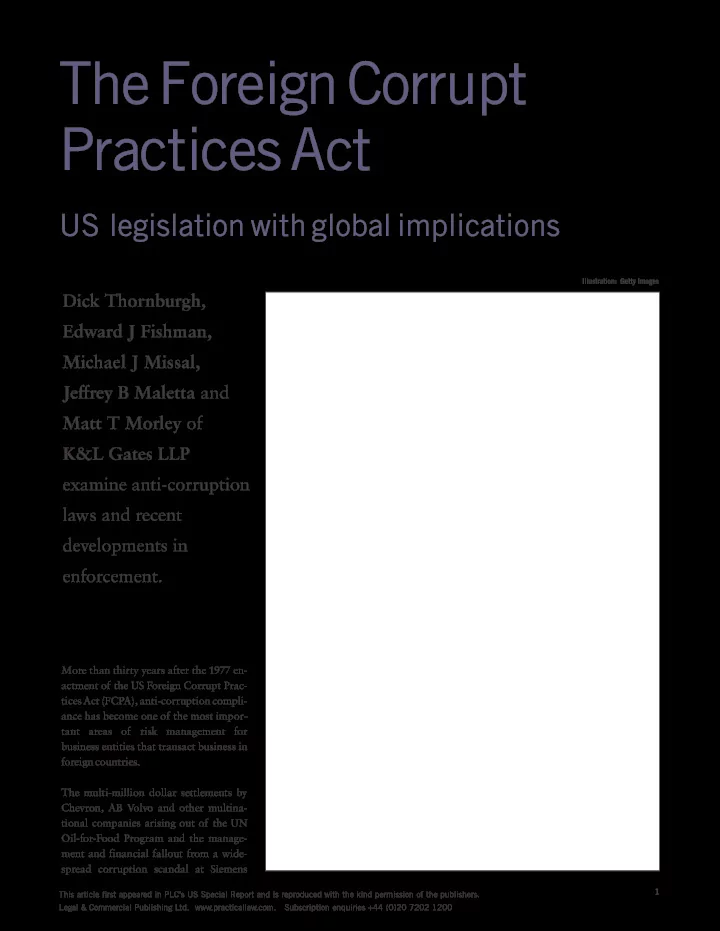

The Foreign Corrupt Practices Act US legislation with global implications Illustration: Getty Images Dick Thornburgh, Edward J Fishman, Michael J Missal, Jeffrey B Maletta and Matt T Morley of K&L Gates LLP examine anti-corruption laws and recent developments in enforcement. More than thirty years after the 1977 en- actment of the US Foreign Corrupt Prac- tices Act (FCPA), anti-corruption compli- ance has become one of the most impor- tant areas of risk management for business entities that transact business in foreign countries. The multi-million dollar settlements by Chevron, AB Volvo and other multina- tional companies arising out of the UN Oil-for-Food Program and the manage- ment and financial fallout from a wide- spread corruption scandal at Siemens 1 This article first appeared in PLC’s US Special Report and is reproduced with the kind permission of the publishers. Legal & Commercial Publishing Ltd. www.practicallaw.com. Subscription enquiries +44 (0)20 7202 1200
The Foreign Corrupt Practices Act show the significant risks to businesses The FCPA’s extensive jurisdictional reach operating in the global economy posed by violations of anti-corruption laws. These laws are being enforced more vigorously The Foreign Corrupt Practices Act of 1977 (FCPA) anti-bribery provision applies to non- by law enforcement authorities, not only US business entities that: in the US, but around the world. • Register securities on US exchanges. The Department of Justice (DOJ) and the Securities and Exchange Commission • File reports with the Securities and Exchange Commission (SEC) as a result of capital (SEC) continue to lead the effort to eradi- raising activities in the US. cate bribery payments to foreign govern- ment officials. These regulatory authori- These so-called “SEC issuers” include the roughly 1,500 non-US companies that trade ties are on pace in 2008 to exceed histori- American Depository Receipts on the US stock exchanges. cal levels of enforcement activity . The FCPA anti-bribery provision also applies to any person who violates the FCPA while They have recently intensified their focus in US territory, or who makes use of US communications or banking networks in connec- on prosecuting individuals and non-US tion with a violation of the FCPA. The FCPA accounting provisions apply to SEC issuers companies that access US capital markets and to non-US subsidiaries that are controlled by US companies through ownership or and the aggressive enforcement of the otherwise. FCPA is likely to continue. There has also been a surge in anti-corruption enforce- ment by European and other non-US law enforcement authorities, based in part on The FCPA essentially prohibits US citi- have any connection to improper pay- greater collaboration with US authorities zens and permanent residents, both pub- ments at all, and can be charged even if and increased resources for anti-bribery lic and private US companies and certain there is no violation of the anti-bribery initiatives. non-US individuals and entities from statute. bribing foreign government officials in This article focuses on the significance of order to obtain a business advantage. Anti-bribery provision these developments from a compliance Under some circumstances, the FCPA ’s The anti-bribery provision prohibits a standpoint. The global expansion of jurisdiction extends to non-US individu- wide range of conduct arising from inter- anti-corruption enforcement requires als and companies, such as those who use actions with officials and employees of both US and non-US companies to under- the US capital markets, or those who use foreign governments and state-owned en- stand: US communications or banking net- terprises. This prohibited conduct in- works in furtherance of improper pay- cludes the payment of a bribe (in the form • The specific requirements of the FCPA ment schemes ( see box “The FCPA’s of money , gifts, services or other things of and similar anti-corruption laws. extensive jurisdictional reach” ). value) to a non-US government official in order to obtain an improper business ad- • The implications of discovering poten- The FCPA has two main elements: vantage. tial violations. • The anti-bribery provisions, which are The anti-bribery provision also prohibits • The importance of conducting ade- enforced by both the DOJ and the SEC the mere offer of such a payment, either quate due diligence in connection with (against US “issuers”), prohibit giving directly or through a third party agent, for mergers and acquisitions, joint ven- or offering money , gifts or “anything of the purpose of obtaining or retaining tures and other cross-border business value” to a foreign government official business or directing business to any per- transactions. in order to obtain or retain business. son. There are three principal reasons for the expansive scope of the provision: • The accounting provisions, which are FCPA OVERVIEW The FCPA was enacted more than thirty enforced by the SEC, require subject • The definition of a foreign government years ago following post-Watergate era companies to maintain adequate official under the FCPA is very broad disclosures that prominent US compa- “books and records” and “internal so as to include not only government nies had paid substantial bribes to for- controls” over financial transactions. ministers and lower-level government eign government officials to obtain lucra- Significantly , violations of these ac- employees, but also managers and em- tive contracts. counting provisions do not need to ployees of state-owned or state-con- 2 This article first appeared in PLC’s US Special Report and is reproduced with the kind permission of the publishers. Legal & Commercial Publishing Ltd. www.practicallaw.com. Subscription enquiries +44 (0)20 7202 1200
Recommend
More recommend